Researchers at the University of California, Davis successfully created antibodies for the SARS-CoV-2 spike protein derived from hen eggs. According to the university, these antibodies could be used to treat or help prevent COVID-19 infection.
The peer-reviewed study was published on Saturday in Viruses journal.
Why birds?
Rodrigo Gallardo, a professor of poultry medicine at the Department of Population Health and Reproduction at the UC Davis School of Veterinary Medicine, explained that birds are ideal for producing many antibodies quickly and inexpensively.
“The beauty of the system is that you can produce a lot of antibodies in birds,” he said. “In addition to a low cost to produce these antibodies in hens, they can be updated very fast by using updated antigens to hyperimmunize hens, allowing protection against current variant strains.”
“In addition to a low cost to produce these antibodies in hens, they can be updated very fast by using updated antigens to hyperimmunize hens, allowing protection against current variant strains.”
Rodrigo Gallardo
Birds produce the antibody IgY, which is similar to the human antibody IgG and does not trigger allergic or immune reactions when injected into humans. IgY is present in birds' serum and in their eggs, and since hens lay about 300 eggs per year, they allow large amounts of IgY to be collected, UC Davis cited Gallardo as saying.

The Experiment
The researchers administered to the hens two doses of three vaccines that bind to the SARS-CoV-2 spike protein or receptor binding domain and measured the antibodies in blood samples collected from the hens and from egg yolks three and six weeks from the vaccination.
Researchers at the National Center for Biodefense and Infectious Diseases at George Mason University in Virginia tested purified antibodies to determine their ability to prevent SARS-CoV-2 from infecting human cells, UC Davis added.
What did the research find?
The researchers found that both the eggs and the sera contained antibodies capable of identifying SARS-CoV-2, but antibodies from the sera were more effective at destroying the viral particles, according to UC Davis.
In conjunction with Daria Mochly-Rosen at Stanford University and Michael Wallach at the University of Technology in Sydney, Australia, Gallardo aims to use these antibodies in a spray that could be used by people who have an increased risk of COVID-19 exposure.
